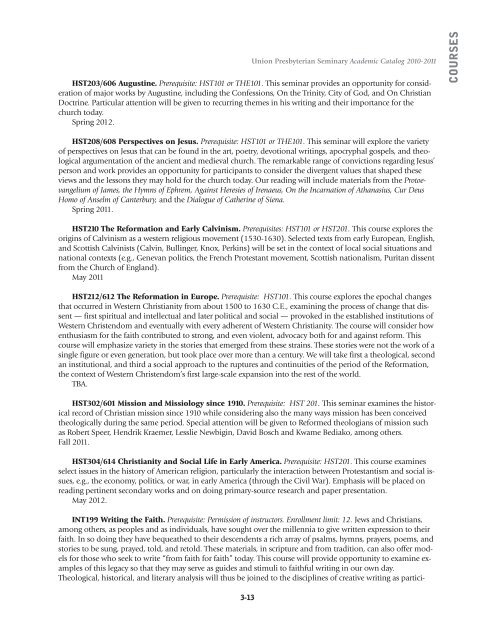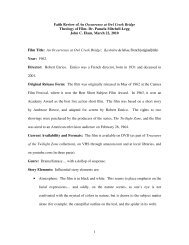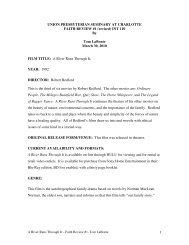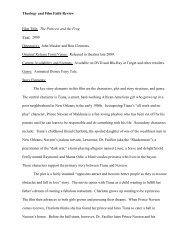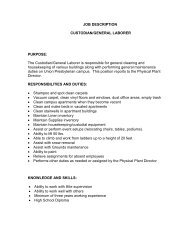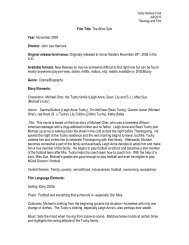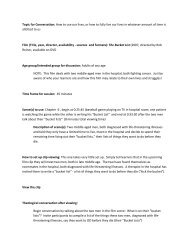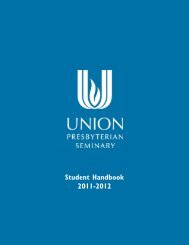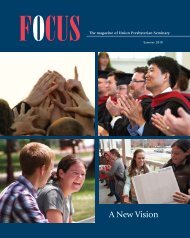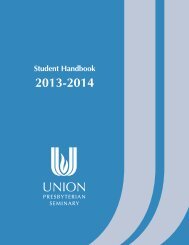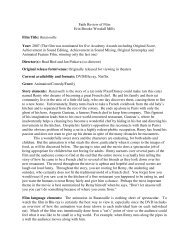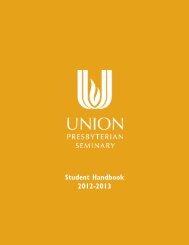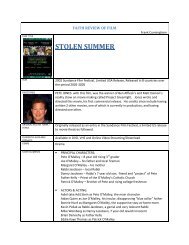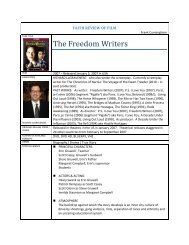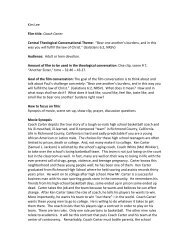Academic Catalog 2010-2011 - Union Presbyterian Seminary
Academic Catalog 2010-2011 - Union Presbyterian Seminary
Academic Catalog 2010-2011 - Union Presbyterian Seminary
Create successful ePaper yourself
Turn your PDF publications into a flip-book with our unique Google optimized e-Paper software.
<strong>Union</strong> <strong>Presbyterian</strong> <strong>Seminary</strong> <strong>Academic</strong> <strong>Catalog</strong> <strong>2010</strong>-<strong>2011</strong>HST203/606 Augustine. Prerequisite: HST101 or THE101. This seminar provides an opportunity for considerationof major works by Augustine, including the Confessions, On the Trinity, City of God, and On ChristianDoctrine. Particular attention will be given to recurring themes in his writing and their importance for thechurch today.Spring 2012.COURSESHST208/608 Perspectives on Jesus. Prerequisite: HST101 or THE101. This seminar will explore the varietyof perspectives on Jesus that can be found in the art, poetry, devotional writings, apocryphal gospels, and theologicalargumentation of the ancient and medieval church. The remarkable range of convictions regarding Jesus’person and work provides an opportunity for participants to consider the divergent values that shaped theseviews and the lessons they may hold for the church today. Our reading will include materials from the Protoevangeliumof James, the Hymns of Ephrem, Against Heresies of Irenaeus, On the Incarnation of Athanasius, Cur DeusHomo of Anselm of Canterbury, and the Dialogue of Catherine of Siena.Spring <strong>2011</strong>.HST210 The Reformation and Early Calvinism. Prerequisites: HST101 or HST201. This course explores theorigins of Calvinism as a western religious movement (1530-1630). Selected texts from early European, English,and Scottish Calvinists (Calvin, Bullinger, Knox, Perkins) will be set in the context of local social situations andnational contexts (e.g., Genevan politics, the French Protestant movement, Scottish nationalism, Puritan dissentfrom the Church of England).May <strong>2011</strong>HST212/612 The Reformation in Europe. Prerequisite: HST101. This course explores the epochal changesthat occurred in Western Christianity from about 1500 to 1630 C.E., examining the process of change that dissent— first spiritual and intellectual and later political and social — provoked in the established institutions ofWestern Christendom and eventually with every adherent of Western Christianity. The course will consider howenthusiasm for the faith contributed to strong, and even violent, advocacy both for and against reform. Thiscourse will emphasize variety in the stories that emerged from these strains. These stories were not the work of asingle figure or even generation, but took place over more than a century. We will take first a theological, secondan institutional, and third a social approach to the ruptures and continuities of the period of the Reformation,the context of Western Christendom’s first large-scale expansion into the rest of the world.TBA.HST302/601 Mission and Missiology since 1910. Prerequisite: HST 201. This seminar examines the historicalrecord of Christian mission since 1910 while considering also the many ways mission has been conceivedtheologically during the same period. Special attention will be given to Reformed theologians of mission suchas Robert Speer, Hendrik Kraemer, Lesslie Newbigin, David Bosch and Kwame Bediako, among others.Fall <strong>2011</strong>.HST304/614 Christianity and Social Life in Early America. Prerequisite: HST201. This course examinesselect issues in the history of American religion, particularly the interaction between Protestantism and social issues,e.g., the economy, politics, or war, in early America (through the Civil War). Emphasis will be placed onreading pertinent secondary works and on doing primary-source research and paper presentation.May 2012.INT199 Writing the Faith. Prerequisite: Permission of instructors. Enrollment limit: 12. Jews and Christians,among others, as peoples and as individuals, have sought over the millennia to give written expression to theirfaith. In so doing they have bequeathed to their descendents a rich array of psalms, hymns, prayers, poems, andstories to be sung, prayed, told, and retold. These materials, in scripture and from tradition, can also offer modelsfor those who seek to write “from faith for faith” today. This course will provide opportunity to examine examplesof this legacy so that they may serve as guides and stimuli to faithful writing in our own day.Theological, historical, and literary analysis will thus be joined to the disciplines of creative writing as partici-3-13


